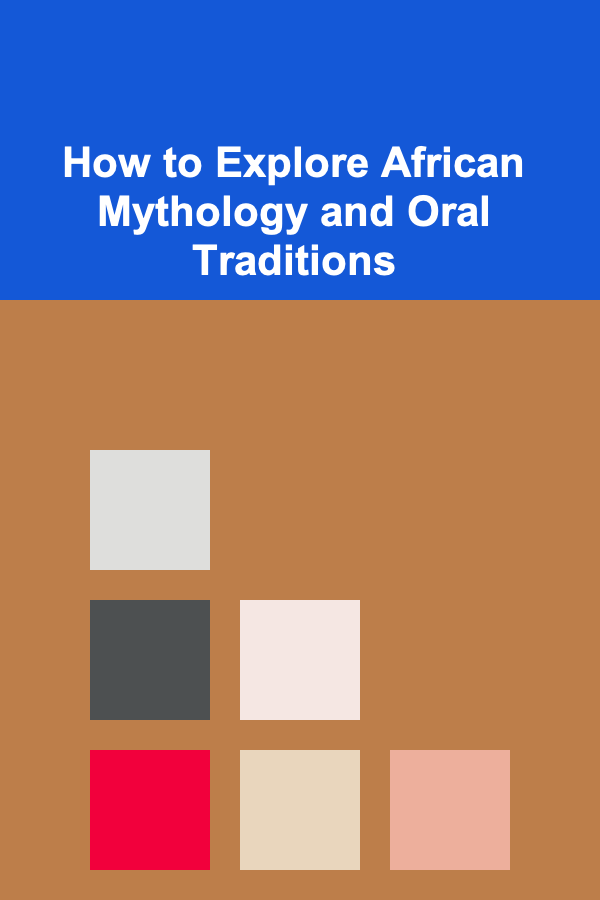
How to Explore African Mythology and Oral Traditions
ebook include PDF & Audio bundle (Micro Guide)
$12.99$5.99
Limited Time Offer! Order within the next:

African mythology is a fascinating and rich tapestry of stories, beliefs, and traditions that span across the diverse cultures of the continent. From the desert sands of the Sahara to the lush jungles of Central Africa, these myths and oral traditions are as varied as the landscapes themselves. They offer deep insights into the spiritual, social, and cultural life of African societies. In this article, we will delve into how to explore African mythology and oral traditions, examining their significance, key themes, and the methods through which these stories have been passed down through generations.
The Importance of Oral Tradition
Oral tradition is the foundation of African mythology. Unlike written traditions, oral traditions rely on the spoken word to preserve and transmit knowledge. This includes stories, proverbs, songs, rituals, and historical accounts. Oral traditions are deeply ingrained in the everyday lives of many African communities, where elders, storytellers, and griots (traditional bards) are responsible for passing down wisdom to the younger generation.
Preservation of History and Culture
One of the primary functions of oral tradition in African societies is the preservation of history. Myths and stories often serve as historical records of a people's origins, migrations, battles, and triumphs. For example, the oral traditions of the Zulu people, one of South Africa's most well-known ethnic groups, include stories of their creation and their rise to power under the leadership of King Shaka Zulu. These stories are not merely mythological but are interwoven with real historical events and figures.
Moreover, oral traditions are a way of preserving cultural identity. Through storytelling, songs, and rituals, Africans pass on their values, morals, social norms, and customs. This is essential in maintaining a sense of community and continuity, particularly in societies where written records may be scarce or non-existent.
Spiritual and Cosmological Insights
African mythology offers profound insights into the spiritual and cosmological beliefs of various ethnic groups. The stories often explain the creation of the world, the origin of humanity, the nature of the divine, and the relationship between humans, gods, and nature. Deities, spirits, and ancestors play a central role in African mythology, and they are often depicted as powerful, wise, and sometimes mischievous beings who influence the lives of mortals.
For example, in Yoruba mythology, the deity Olodumare is considered the supreme god, creator of the universe, and ruler of destiny. The Yoruba people also believe in the Orishas, lesser gods who govern various aspects of life, such as fertility, wisdom, and war. The complex interplay of these deities and their interactions with humans form a vital part of Yoruba cosmology.
Key Themes in African Mythology
While African mythology is not monolithic---since it varies greatly from one region to another---there are several recurring themes that are commonly found across different cultures. Understanding these themes will help you explore African mythology in greater depth.
Creation Myths
Creation myths are a fundamental aspect of many African mythologies. They provide explanations for how the world and humanity came into being. These myths often feature gods or divine beings who shape the universe out of chaos or nothingness. In many African cultures, the creation of humanity is linked to the earth, animals, and the elements.
For example, the Dogon people of Mali have a creation myth that explains how the first humans were shaped from clay by the god Amma. According to the myth, Amma created the universe and then molded the first human beings out of the clay, giving them life. This myth highlights the connection between humanity and the earth, as well as the divine nature of creation.
Trickster Figures
Many African mythologies feature trickster figures---characters who use cunning, wit, and deception to outsmart others, often challenging social norms and authority. These tricksters are complex characters who can be both humorous and wise, and their stories often convey moral lessons about the nature of humanity and the consequences of selfishness or greed.
One of the most famous trickster figures in African mythology is Anansi the Spider, from the Akan people of West Africa. Anansi is known for his cleverness and his ability to manipulate situations to his advantage. His stories are entertaining, but they also teach valuable lessons about intelligence, resilience, and the consequences of deceit.
Death and the Afterlife
The concept of death and the afterlife is a significant theme in many African mythologies. African societies often view death as a transition rather than an end, and the afterlife is seen as a continuation of existence in a different form. Ancestors are revered, and their spirits are believed to have an ongoing influence on the lives of the living.
In the mythology of the Akan people, the soul's journey after death involves passing through various stages before it reaches the ancestral realm. The living are responsible for maintaining relationships with their ancestors through rituals, offerings, and prayers to ensure their continued protection and blessings.
The Role of Ancestors
Ancestors play a central role in African mythology and spirituality. They are believed to have transcended to the spiritual realm but still influence the lives of their descendants. In many African cultures, the dead are not forgotten but are honored and revered through rituals, ceremonies, and oral stories.
For instance, in many Bantu-speaking societies, ancestors are considered the intermediaries between the living and the divine. They are called upon for guidance, protection, and blessings. Ancestor worship is not a form of idol worship but rather a way of honoring the deceased and seeking their wisdom.
Nature and the Environment
The natural world---rivers, mountains, forests, and animals---is often central to African mythology. Many African myths explain the origins of natural features or describe the relationship between humans and nature. This reflects the deep connection that African societies have with the land and its resources.
In the mythology of the Digo people of East Africa, for example, there are stories about the origin of certain trees and animals, and these creatures are believed to possess spiritual significance. This reflects a worldview in which the natural world is seen as sacred, with each element playing a role in the cosmic order.
How to Explore African Mythology
Study the Myths of Different Cultures
The first step in exploring African mythology is to study the myths of different African cultures. Africa is an incredibly diverse continent, with thousands of ethnic groups, each with its own set of myths and traditions. Some cultures have well-documented mythologies, while others rely on oral tradition to pass down their stories.
Reading books, articles, and academic papers on African mythology is a good starting point. Many scholars have researched African myths and collected them in books, such as The African Origin of Civilization by Cheikh Anta Diop, or African Mythology by Jan Knappert. These resources provide valuable insights into the themes, characters, and cultural context of African myths.
Engage with the Oral Tradition
Since African mythology is primarily transmitted through oral tradition, engaging directly with the oral practices of African cultures is essential. This can involve attending storytelling events, listening to griots, or even participating in traditional ceremonies. Oral tradition is not just about the myths themselves but also about the way these stories are told---through voice, rhythm, and performance.
If you have the opportunity, visit African communities where oral tradition is still practiced. Many African societies place a strong emphasis on storytelling as a form of cultural education. You can also listen to recordings of traditional African storytelling or view performances that highlight these oral traditions.
Explore Folklore and Music
Folklore and music are closely linked to African mythology. Songs, chants, and rhythms often accompany storytelling and ritual practices, creating an immersive experience. Traditional music often carries the themes of African myths, telling stories of gods, heroes, ancestors, and nature through song.
Listening to traditional African music from different regions can offer deeper insights into the mythology of those cultures. For instance, drumming plays a crucial role in many African rituals, serving as a medium for communication with the spiritual world. The rhythms, melodies, and instruments used in these performances can help you understand the spiritual significance of the stories.
Engage with Contemporary Interpretations
While traditional African myths are passed down orally, contemporary writers, artists, and filmmakers have also engaged with these myths in creative ways. African literature, for instance, is full of references to traditional mythology, as seen in the works of authors like Chinua Achebe and Wole Soyinka. These modern interpretations often provide a fresh perspective on ancient myths, blending traditional beliefs with contemporary issues.
Similarly, African cinema and theater often draw on mythological themes. Movies such as Black Panther have brought African mythology into the global spotlight, showcasing the power and relevance of these stories in the modern world.
Participate in Rituals and Ceremonies
Another way to explore African mythology is by participating in or observing traditional rituals and ceremonies. Many African cultures celebrate important life events, such as births, marriages, and deaths, with rituals that incorporate mythological beliefs. These rituals often involve storytelling, music, dance, and sacrifices to honor the gods or ancestors.
If you are able to travel to Africa, you may have the opportunity to witness or participate in such ceremonies. Engaging in these rituals can deepen your understanding of how mythology is integrated into daily life and spiritual practice.
Conclusion
Exploring African mythology and oral traditions is a journey into the heart of African cultures. These myths are not merely ancient stories; they are living traditions that continue to shape the spiritual, social, and cultural fabric of African societies. By studying the myths, engaging with oral traditions, and participating in rituals, you can gain a deeper understanding of the values, beliefs, and history of African peoples. This exploration will not only enrich your knowledge of African cultures but also provide a unique perspective on the universal themes that connect us all.

How to Choose the Best Health Savings Account (HSA) for Your Needs
Read More
How to Plan a Family Picnic in Your Backyard
Read More
How to Store Resistance Bands and Weights Efficiently
Read More
Start Here: The Guide to Time Blocking
Read More
The Best Cheaper Alternatives for Popular Brands Without Sacrificing Style or Performance
Read More
How to Write a Compelling Grant Proposal for Social Services
Read MoreOther Products

How to Choose the Best Health Savings Account (HSA) for Your Needs
Read More
How to Plan a Family Picnic in Your Backyard
Read More
How to Store Resistance Bands and Weights Efficiently
Read More
Start Here: The Guide to Time Blocking
Read More
The Best Cheaper Alternatives for Popular Brands Without Sacrificing Style or Performance
Read More